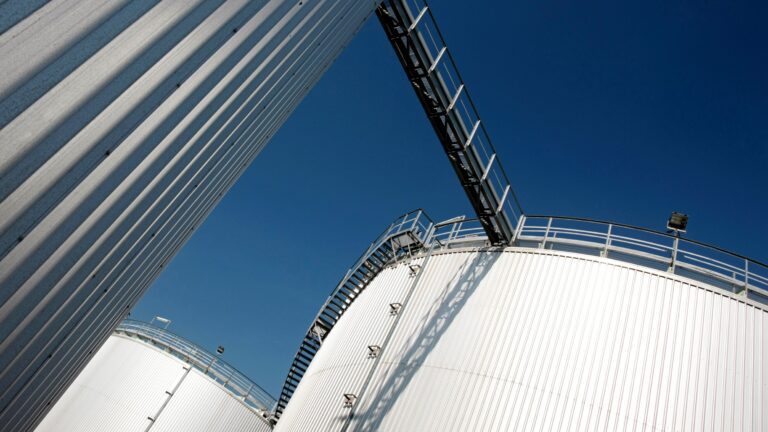
Here, Peter highlights the central role terminals play in the supply security and resilience of products critical to our daily lives, and shines a light on the proactive steps the sector is taking to open up new possibilities on the journey towards carbon neutrality.
The bulk storage and energy infrastructure sector plays a vital role in providing services that are critical to UK, European and global consumers. The sector supports an essential interface between sea, road, rail and pipeline logistics for a diverse range of products that are essential to our daily lives, including transport and heating fuels, chemicals, animal feed and foodstuffs.
Terminals also provide greater resilience within the supply chain by ensuring flexibility to meet demand, particularly in periods where domestic supplies of stored products cannot be guaranteed.
Around twenty-two of the terminals operated by Tank Storage Association (TSA) members in the UK are designated by the Government as Critical National Infrastructure (CNI) due to their importance in providing energy to industrial, transport and defence markets. Storage capacity also includes strategic reserves held for emergencies and supply disruptions.
Most recently, the ‘energy trilemma’ of security, affordability and sustainability has come into sharper focus owing to shifts across energy markets – driven largely as a consequence of Russia’s war in Ukraine – and in the wider geopolitical landscape.
These shifts have also resulted in greater volatility and fragmentation and in some nations taking steps aimed at minimising dependencies on ‘non-aligned blocs’. And it is against this backdrop that the TSA, as part of its active membership of the Federation of European Tank Storage Associations (FETSA), commissioned a series of studies analysing the role of European tank storage in the global energy system.
An evolving role
As part of this series of studies, The Hague Centre for Strategic Studies (HCSS) has examined changing geopolitical landscapes and the evolving role of terminals. In this study, titled “European tank storage and changing geopolitical landscapes”, the HCSS delves deeper into the impact of the war in Ukraine on European energy security and decarbonisation, with a specific focus on the bulk storage and energy infrastructure sector.
The report highlights the fact that, while international trade remains essential for the supply security of a range of strategic industrial and energy products, it is taking place under increasingly challenging conditions.
And growing global strategic competition, accelerated by the Covid-19 pandemic and the Russian invasion of Ukraine in early 2022, has been reflected in a wider move toward protectionism and increased state support for strategic sectors.
Indeed, the report notes that China, the US, Japan and the EU have all introduced plans to increase self-sufficiency, for example, in digital technologies, such as chips and artificial intelligence, energy – critical minerals and green tech – as well as space and defence.
Most recently, the US Inflation Reduction Act (IRA) 2022 , signed into law on 16 August 2022, commits, among other measures, $370 billion to improve energy security and promote innovative technologies through a mix of tax incentives, loan guarantees and grants, while in the EU the Critical Raw Materials Act (CRMA) and Net Zero Industry Act (NZIA), widely seen as a response to IRA 2022, are aimed at accelerating the move toward a competitive green economy.
There are other examples too. Japan’s Green Transformation Promotion Act, known as ‘GX’, aims to mobilise over 150 trillion yen (well over $1 trillion) through cooperation between the public and private sectors over the next 10 years to ensure a stable supply of energy, strengthen industrial competitiveness and promote decarbonisation efforts.
Australia has also established the A$15 billion National Reconstruction Fund to support supply chains and bolster the development of strategically important industries.
New strategy for critical imports and supply In the UK, the government has recently published its first critical imports and supply chain strategy, which aims to build resilient supply chains and safeguard critical imports.
This strategy notes that dynamic changes within the global context, the intensification of systematic competition and signs of fragmentation of the global economic and trade order, climate change and the Covid-19 pandemic among others, have highlighted vulnerabilities of the UK’s essential supply chains. It therefore focuses on the reliable access to the critical imports and goods needed now and in the future.
The strategy defines critical imports as ‘those goods imported into the UK which are critical to the UK security and prosperity’, further noting that ‘[t]his primarily refers to goods which are essential for the operation of the UK’s designated Critical National Infrastructure (CNI) sectors and / or to the success of the government’s five growth sectors’.
Critical Imports Council
CNI currently encompasses the chemicals, civil nuclear, communications, defence, emergency services, energy, finance, food, government, health, space, transport and water sectors. A new Critical Imports Council is expected to be set up shortly to bring together businesses in critical and growth sectors and government to identify risks to critical imports and develop an action plan. In addition to the Critical Imports Council, new structures within government are expected to be set up to manage and assess delivery of the strategy and a progress update, setting out the steps that have been taken to manage the delivery of the strategy and plans for further work, will be published in due course.
The Energy Act 2023, meanwhile, described by the government as the “largest piece of energy legislation in a generation”, aims to deliver “a cleaner, more affordable and more secure energy system that is fit for the future.” It covers a wide range of areas from oil and gas to nuclear, as well as nuclear fusion, hydrogen, carbon capture and storage and renewable energy. In particular, Part 12 of the Act, which came into force in January 2024 and is aimed at addressing matters around energy security of supply, gives the Secretary of State for Energy Security and Net Zeronew key powers, including powers to impose obligations on companies to take such actions as thought necessary to ensure the resilience of supply and continuity of certain core fuels. It also creates a duty on core fuel sector participants to report a notifiable incident, such as an incident which affects their relevant activities or assets in such a way as to create a significant risk of or cause, disruption to or failure of the continuity of core fuel supply.
The Act further sets out the thresholds specifying whom the statutory duty to report an incident applies to. The thresholds specify that the measure applies to operators or facility owners with an annual capacity over 500,000 tonnes.
New technology
In addition, Part 4 of the Act covers new technology. For example, the Act notes that the Secretary of State must carry out a public consultation, hosted by the Department for Transport, on the options for designing and implementing a Sustainable Aviation Fuel (SAF) revenue certainty scheme in order to secure consistent fuel supply. This mechanism is set to be introduced by the end of 2026 and will run in parallel with a mandate requiring 10% of fuel supply to be SAF by 2030 rising to 75% in 2050.
The Act further states that a report to Parliament on the progress made towards the development of a sustainable aviation fuel revenue certainty scheme will have to be laid within 18 months from 26 October 2023. Also, Part 2 of the Act covers carbon dioxide capture, storage etc. and hydrogen production, transport and storage.
What is abundantly clear is the pivotal role of resilient infrastructure and supply chains to not only mitigate price shocks and supply shortages but also, as we look ahead, to secure supplies of future energy carriers, particularly at a time of longer and more volatile supply chains that may be impacted, for example, by geopolitical developments, weather events or logistics bottlenecks. The need for sufficient available storage capacity and strategic stocks across a range of current and future energy carriers and industrial inputs is also clear.
A pivotal sector
The bulk storage and energy infrastructure sector will continue to be pivotal in mitigating risks by providing resilient infrastructure and supply chains and by holding sufficient stocks of critical products. On the journey towards carbon neutrality, tank storage infrastructure will go through significant changes and will require significant investment and planning to ensure the import, production, storage and transport of new energy carriers.
Looking ahead, energy carriers used across sectors and industries will vary and more types of fuels and carriers will likely need to be stored in strategic reserves. Adaptations as regards infrastructure for new fuels and energy carries, and the transportation of these, will also have to form part of considerations.
The complex journey ahead will therefore undoubtedly require a framework that engenders investor confidence and partnership with the bulk storage and energy infrastructure sector to help reach the solutions that will mitigate risks amidst geopolitical shifts, but also deliver on future opportunities.
The Tank Storage Association continues to highlight the central role terminals play in the supply security and resilience of the products that are critical to our daily lives. And it will continue to work with the government and key stakeholders to help to deliver on the opportunities and innovative solutions that will support the achievement of the UK’s climate neutrality targets, shining a light on the proactive steps the sector is taking to open up new possibilities.
Image credit: Tank Storage Association
